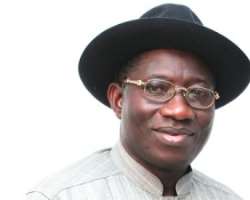Jonathan calls for UN Security Council reform

President Goodluck Jonathan on Wednesday in New York, the United States of America, called for the review of the United Nations Security Council in the face of global insecurity challenges.
Presidential spokesman, Dr. Reuben Abati said Jonathan, made this call while delivering Nigeria's annual statement to the United Nations General Assembly.
Abati said Jonathan's call for the reform was predicated on the need for 'transparency, inclusivity, and common ownership' in the UN Security Council.
'The failure of unanimity of action by the Security Council over pressing challenges to global peace and security in Syria, Iraq, the conflict in Ukraine, and the renewed aggression between Israel and Palestine, have strengthened the case for the reform of the Security Council,' President Jonathan was quoted as telling the annual gathering of global leaders.
The President also called for an urgent review of the United Nations peacekeeping operations across the world.
He added, 'Today's challenges can only be resolved by a Security Council whose working methods engender transparency, inclusivity, and common ownership through equitable representation of all regions in the decision making process of the council.
'It is imperative that we take advantage of 2015, which also marks the 50th Anniversary of the 1965 reform, to make concrete progress on the reform of the council.
'We call for a fast-tracked process, in line with the initiative of His Excellency John Ashe, President of the 68th General Assembly, for establishing a working group on reform.
'Indeed, the Security Council requires the collective resolve of all member states to ensure that 2015 brings decisive progress.'
The President noted that the world continued to witness war, even though, the UN was established about 70 years ago to save succeeding generations from the scourge of war.
He also said, 'Today's terrorism is vicious and aimless. Its consequences are extremely agonising, marked by a tendency to annihilate victims, and completely destroy infrastructure and properties. The involvement of foreign fighters has remained a common feature of terrorist groups - whether Al Qaeda in the Maghreb, Al Shaabab in Somalia, Boko Haram in Nigeria, or the newly emerging Islamic State.
'The new dimension introduced by the IS to conquer territory and establish its destructive ideology, is a major challenge that must be collectively halted before it becomes the norm.
This refocuses attention on the need to review present tools for United Nations peacekeeping operations.'
He, however, assured the gathering that Nigeria would continue to do everything possible to rescue the over 200 schoolgirls abducted from the Government Secondary School, Chibok, Borno State in April.
He also expressed the determination of his administration to curb the violent and criminal activities of Boko Haram.
He said, 'I would like to take this opportunity to thank all the countries and organisations that expressed solidarity with us, and have continued to support our determined efforts to free our daughters.
'Although it has been over three months since they were abducted, we have never relented in our efforts to set them safely free. Together with our partners, we are working assiduously to free our daughters and reunite them with their families.
'Let me underline today, that we shall not waiver until we end this mindless war on the innocent, and bring all the perpetrators to justice. We will triumph over terrorism.'
On the deadly Ebola Virus Disease in West Africa, the President assured the United Nations that Nigeria was now free of Ebola.
But he said that the world must act in unison to stop the disease from becoming a global disaster.
The President said, 'While Nigeria was able to respond effectively to control the spread of the disease, the situation in Liberia and Sierra Leone requires sustainable, collective global action to contain. Through the concerted efforts of our healthcare professionals, the World Health Organisation and our international partners, we have been able to contain the EVD and we can confidently say that Nigeria is today, Ebola-free.
'We have however continued to support efforts at containing the spread of the disease in Sierra Leone, Liberia and Guinea. It is pertinent to stress the need for the international community to properly appreciate the enormity of the EVD challenge.'
